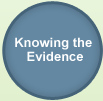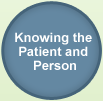Factors that affect decision making
There are many factors involved in clinical decision making and each of the core skills has the potential to impact effective decision making. In an ideal world decisions would be made objectively, with a full set of evidence, an endless bank of resources, no time pressures, minimal interruptions, decision support tools to hand and plenty of energy to handle any decision making situation at any time of the day.
However, this is not always the reality. Clinical decision making is a balance of known best practice (the evidence, the research), awareness of the current situation and environment, and knowledge of the patient. It is about 'joining the dots' to make an informed decision. Informed clinical decision making should include a variety of information and knowledge sources.




Knowing the subject area and evidence base
There are a wide variety of online journals, books and reference materials you can utilise to research the evidence base. The Knowledge Network is a useful starting point. As experience develops you will identify and build your set of cases with identifiable patterns and typical outcomes that can provide valuable background knowledge when dealing with a current situation.
Knowing Yourself
Being aware of your behaviour, competencies, attitudes, emotions and values and not just your own but also those of your patients/clients and colleagues. It's also important to know your limitations - being aware of when to seek help, advice and support. Remember - you are part of a team.
Knowing the Patient and Person
Knowing the patient's preferences, their experiences of illness and their current situation or care needs and what is normal for that patient in terms of observation, mobility and level of function. It's important to consider feedback from decision making tools that you can use to capture patient information and analyse results.
Knowing the Environment
Awareness and recognition of the approach to decision making and the wider team dynamics within your organisation.

